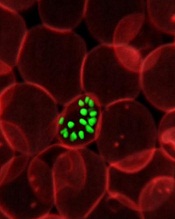User login

red blood cell; Credit: St Jude
Children’s Research Hospital
Scientists have uncovered a number of potential targets for a blood-stage malaria vaccine.
The team assessed how antibodies from a group of malaria-infected children responded to a library of proteins from the Plasmodium falciparum parasite.
This revealed antigens that had not previously been identified as possible vaccine targets and provided new insight into the ways antigens could be used in combination to increase protection from malaria.
“Resistance to malaria drugs is an increasing problem, so vaccines are desperately needed to battle the Plasmodium falciparum parasite before it has a chance to make people sick,” said Faith Osier, MBChB, of the Kenya Medical Research Institute in Nairobi City.
“This study presents us with a large number of new vaccine candidates that offer real hope for the future.”
Dr Osier and her colleagues described the study in Science Translational Medicine.
The researchers generated a library of correctly folded, full-length proteins from the P falciparum parasite. They then tested antibody reactivity against these proteins in a cohort of Kenyan children who were monitored for clinical episodes of malaria over 6 months.
This revealed antibodies that provide protection against clinical episodes of malaria. Some were equivalent or superior to current leading malaria vaccine candidates.
In fact, combinations consisting of 5 of the 10 top-ranked antigens (PF3D7_1136200, MSP2, RhopH3, P41, MSP11, MSP3, PF3D7_0606800, AMA1, Pf113, and MSRP1) could provide 100% protection against clinical episodes of malaria.
The researchers said these results add further weight to the theory that a successful blood-stage vaccine needs to target multiple antigens.
The team’s next step will be to generate antibodies against all of the proteins in the library and test them in different combinations to see whether combinations that appear to provide protection can directly prevent parasite invasion. ![]()

red blood cell; Credit: St Jude
Children’s Research Hospital
Scientists have uncovered a number of potential targets for a blood-stage malaria vaccine.
The team assessed how antibodies from a group of malaria-infected children responded to a library of proteins from the Plasmodium falciparum parasite.
This revealed antigens that had not previously been identified as possible vaccine targets and provided new insight into the ways antigens could be used in combination to increase protection from malaria.
“Resistance to malaria drugs is an increasing problem, so vaccines are desperately needed to battle the Plasmodium falciparum parasite before it has a chance to make people sick,” said Faith Osier, MBChB, of the Kenya Medical Research Institute in Nairobi City.
“This study presents us with a large number of new vaccine candidates that offer real hope for the future.”
Dr Osier and her colleagues described the study in Science Translational Medicine.
The researchers generated a library of correctly folded, full-length proteins from the P falciparum parasite. They then tested antibody reactivity against these proteins in a cohort of Kenyan children who were monitored for clinical episodes of malaria over 6 months.
This revealed antibodies that provide protection against clinical episodes of malaria. Some were equivalent or superior to current leading malaria vaccine candidates.
In fact, combinations consisting of 5 of the 10 top-ranked antigens (PF3D7_1136200, MSP2, RhopH3, P41, MSP11, MSP3, PF3D7_0606800, AMA1, Pf113, and MSRP1) could provide 100% protection against clinical episodes of malaria.
The researchers said these results add further weight to the theory that a successful blood-stage vaccine needs to target multiple antigens.
The team’s next step will be to generate antibodies against all of the proteins in the library and test them in different combinations to see whether combinations that appear to provide protection can directly prevent parasite invasion. ![]()

red blood cell; Credit: St Jude
Children’s Research Hospital
Scientists have uncovered a number of potential targets for a blood-stage malaria vaccine.
The team assessed how antibodies from a group of malaria-infected children responded to a library of proteins from the Plasmodium falciparum parasite.
This revealed antigens that had not previously been identified as possible vaccine targets and provided new insight into the ways antigens could be used in combination to increase protection from malaria.
“Resistance to malaria drugs is an increasing problem, so vaccines are desperately needed to battle the Plasmodium falciparum parasite before it has a chance to make people sick,” said Faith Osier, MBChB, of the Kenya Medical Research Institute in Nairobi City.
“This study presents us with a large number of new vaccine candidates that offer real hope for the future.”
Dr Osier and her colleagues described the study in Science Translational Medicine.
The researchers generated a library of correctly folded, full-length proteins from the P falciparum parasite. They then tested antibody reactivity against these proteins in a cohort of Kenyan children who were monitored for clinical episodes of malaria over 6 months.
This revealed antibodies that provide protection against clinical episodes of malaria. Some were equivalent or superior to current leading malaria vaccine candidates.
In fact, combinations consisting of 5 of the 10 top-ranked antigens (PF3D7_1136200, MSP2, RhopH3, P41, MSP11, MSP3, PF3D7_0606800, AMA1, Pf113, and MSRP1) could provide 100% protection against clinical episodes of malaria.
The researchers said these results add further weight to the theory that a successful blood-stage vaccine needs to target multiple antigens.
The team’s next step will be to generate antibodies against all of the proteins in the library and test them in different combinations to see whether combinations that appear to provide protection can directly prevent parasite invasion. ![]()